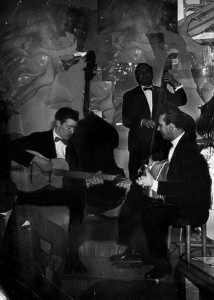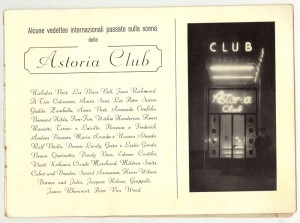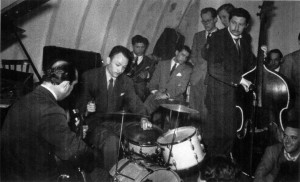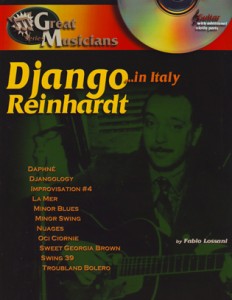Excerpt from “Django Reinhardt in Italy” ed. Carish/Music Sales
While on the horizon acetate slowly declined to be replaced by 78 rpm records, in Paris a certain Dizzy was performing what could be defined as the first concert of Modern Jazz, sparking a sharp debate among fans of Be-bop – the Jazz of the future, symbol of modernity and progress – and those of Classic Jazz – a reminder of past times, times of war and suffering and maybe because of this hardly borne, actually more by the plexus than by the ears. Critics ride, exploit, and stir up trouble. The guitarist – born in Belgium but of Manouche origins – and the violinist – born in France but of Italian origins – idols of swing that the war had separated, had just met again and reassembled the Quintette. But even if their greatness was unanimously recognised, they found themselves negatively involved in these internal fights.
 “They play so fast, so fast!” exclaimed Django on one evening of May 1945 while he was listening to Gillespie and His All Star Quintet with Charlie Parker. He was not jealous, he was on the contrary interested in the new trend and it was with a new enthusiasm that he played with Bird, Miles and Dizzy. To the critics, who were sitting many rows behind him hinting at an influence of Bop over the guitarist, the journalist and critic Livio Cerri pointed out that the taste of Django for discords traced back far before the birth of the Bop school, so if anything he was one of its pioneers!
“They play so fast, so fast!” exclaimed Django on one evening of May 1945 while he was listening to Gillespie and His All Star Quintet with Charlie Parker. He was not jealous, he was on the contrary interested in the new trend and it was with a new enthusiasm that he played with Bird, Miles and Dizzy. To the critics, who were sitting many rows behind him hinting at an influence of Bop over the guitarist, the journalist and critic Livio Cerri pointed out that the taste of Django for discords traced back far before the birth of the Bop school, so if anything he was one of its pioneers!
Meanwhile at the Gare de Lyon, Django and Staphane met their American colleagues, who came back to playing in Europe after the end of the war, and greeted them smiling. But on that day their instrument cases seemed heavier, since on them, among the labels of the cities they had played in, was that of a by now out-dated jazz. They left Paris to accept the proposal of an Italian manager, who at that time – just like in a film by Woody Allen – could equally manage ballerinas, magicians, Louis Armstrong or Buffalo Bill and organise both big tours and single evenings.
In the first days of December 1948 Grappelli played in Milan at the night club Ciro’s during some evenings and in a couple of concerts at the New Theatre with Joseph Reinhardt (Django’s brother), the double-bass player Giorgio Poli, the pianist Franco Cassano and the guitarist Angelo Servida. “Django, come to Milan immediately! Here there’s the possibility of a two-month contract at the Astoria, a very elegant night-club in Piazza S. Maria Beltrame, not far from the Cathedral.” The violinist told him after having tracked him down at a friend’s house in Rome.
Santa Claus brought a big present that year to the young guitarist from Milan, Franco Cerri, who found himself playing on Boxing Day with the best guitarists of the period. Armando Camera – the other guitarist hired – must instead have regretted having signed a prior contract with an orchestra of Turin and being therefore replaced by Piero Visani! At the back of the night club they smoke, Grappelli sips a cognac; Reinhardt plays poker with the double-bass player Ubaldo Beduschi and other two people. In the seat of RAI in Corso Sempione the musicians of the Gorni Kramer orchestra were left gaping listening to Django, who played Cerri’s electric guitar for twenty minutes.
 “Live he is even more extraordinary!”, exclaimed a customer, since the news that Django was playing at the Astoria Club spread like wildfire and many were the jazz lovers, musicians and guitarists – some of which already well-known – who went to the club that evening to listen to him. Among them were probably Michele Ortuso or Giovanni Ferrero, Cosimo Di Ceglie, Alfio and Rocco Grasso and Franco Pisano. Some had even paid homage to him, like the well-known Luciano Zuccheri, who under his influence founded the ensemble “Quintetto Ritmico di Milano”. Neither tarot cards nor tea leaves could, however, have predicted that the contract would be rejected after only twelve days. “Dance, dance everyone, please do! Django is leaving.”
“Live he is even more extraordinary!”, exclaimed a customer, since the news that Django was playing at the Astoria Club spread like wildfire and many were the jazz lovers, musicians and guitarists – some of which already well-known – who went to the club that evening to listen to him. Among them were probably Michele Ortuso or Giovanni Ferrero, Cosimo Di Ceglie, Alfio and Rocco Grasso and Franco Pisano. Some had even paid homage to him, like the well-known Luciano Zuccheri, who under his influence founded the ensemble “Quintetto Ritmico di Milano”. Neither tarot cards nor tea leaves could, however, have predicted that the contract would be rejected after only twelve days. “Dance, dance everyone, please do! Django is leaving.”
On the train heading to the capital city Django, singing softly “Tornerai” (“J’attendrai”) written by the Italian Dino Olivier – one of the rare pieces of video evidence – he thinks about the first time he came to Italy: it was 1915 in Livorno and then in Rome. His friend, Vittorio Spina, sitting with his guitar on his lap in one the first carriages of the Italian Jazz, remembers Django as a five-year-old boy who spent his days in the Usignolo in Via Anime Sante, listening to the waltzes, polkas and fox trots he played with Paolo, the gipsy guitarist Django strolled around Roma with.
Posing in front of a building named in his honour, Stefano Grappelli wears a tricolour scarf around his waist, but it is not about the violinist so much as his grandfather, mayor of the town of Alatri. “The most important names of wealthy Rome come here” Christian Livorness, a big fan of theirs, informed them while pointing at the Rupe Tarpea, a club at number 13 Via Veneto, in which they were going to play. The two friends were attracted above all by the wonderful smell coming from the kitchen, which wafted right into the dining room where they would be playing. A poster advertised: “The three fulminating fingers” – Django smiled sarcastically looking at his hand. They passed by a little room, named Jicky Club, which was used as a dance hall.
Voilà La Dolce Vita! Boys of good families, politicians and some members of the Vatican. “Look! Porfirio Rubirosa is at that table over there!” The well-selected audience – particularly by the price – was miscellaneous and, apart from some toffee-nosed rich layabouts from Rome, there were people who were really interested in jazz – some even knew it quite well – as well as in beautiful women and champagne. Lover of swing, but father of the intransigent bopper and grandfather of the unbridled rocker who would hardly bear the beat grandchild, he often moved the chairs around the dance floor in order to better listen to the performance of the quintet. Sergio Sangiorgi, president of the Hot Club of Rome, who once organised a concert in the Bernini theatre in Via Borgognona, did the same.
Sometimes Carlo Loffredo replaced Pecori at the double bass and when the manouche couldn’t stand the miserable rooms of the Hotel Alexandra anymore, he took him to Piazzale Clodio, where there was a funfair run by some gipsy cousins, who lived in ten or so caravans. He often spent the night there.
The fork kills more than the sword! Is it possible to give up Italian cuisine? “Well, it is not as refined as the French…and how does Gianni Safred lay the table? And what about how Carlo Percori serves the plates?! Oh mon dieu, Aurelio De Carolis’ pots!” Only a biased palate could state that this cuisine is insipid, spurs taking new risks – also regarding the rhythm – and finding a “broken” accompaniment – like those of the bopper friends – with a quite original phrasings and chords and that it forces the embellishment of the accompaniment of Grappelli’s solos with exquisite and strong interventions.
Don’t you enjoy it Django? And so why did you agree that Livorness should take the matter up with Rai – with which he collaborated hosting a weekly programme from France – to get you a contract and record 70 songs, which would then be aired? Classics of the Quintette du Hot Club de France and famous songs, but also recent compositions or tracks that would become standards of the be-bop repertoire. “I also want to play a guitar improvisation in honour of the great Joaquin Turina, who died about ten days ago”.
Over The Rainbow/Night And Day/Minor Blues/Nature Boy/The World Is Waiting
For The Sunrise/Vous, Qui Passez Sans Me Voir/Hallelujah/Nagasaki/I’ll Never Be
The Same/Swing 39/Clopin-Clopant/Honeysuckle Rose/All The Things You
Are/Djangology/Liza/For Sentimental Reasons/Daphne/La Mer /Sweet Georgia
Brown/Lover Man/Marie/Stormy Weather/Minor Swing/To Each His Own/What Is
This Thing Called Love?/Ou Es-Tu, Mon Amour?/Undecided/Improvisation N°4/I’m
in the Mood for Love/Swing 42/I Surrender Dear/After You’ve Gone/Mam’zelle/I
Got Rythym/I Saw Stars/Artillerie Lourde/It’s Only A Paper Moon/Time On My
Hands/Bricktop/Improvisation Sur La Symphonie No. 6 De Tchaikovsky/My Blue
Heaven/Menilmontant/Swing Guitars/My Melancholy Baby/Truckin’/Webster/Micro
(Mike)1-2/Dream Of You/Begin The Beguine/How High The Moon/Nuages 1-2/I Can’t
Get Started/I Can’t Give You Anything But Love/Manoir De Mes Reves/The Man I
Love/The Peanuts Vendor/Just A Gigolo/Troublant Bolero/Rosetta/Blue Skies/It
Might As Well Be Spring/Blue Lou/I’ll Never Be The Same/Brazil/What A
Difference A Day Made/Pigalle/Body and Soul/Que Reste-t-il de Nos Amours.
Everything in complete freedom in the choice of both songs and the tempo of playing, without any bonds of duration in minutes, and sometimes with no fixed arrangements, but relying completely on the strong empathy between the guitarist and the violinist. Now it would be called a “live disco” or an “unplugged”. Regarding the mystery of these recordings, My Lord, Members of the Court, with the support of the experience of who worked in Rai, we would like to ask the witness Christian Livorness two simple questions:
1. Could a national Body like RAI allow the arbitrary use of its recording studios without a contract providing for the payment of the musicians and the relative right of ownership of what is recorded?
2. In view of the lack of a rigorous control, could it have been possible that someone, maybe a collaborator of Rai, brought home laquers, tapes or discs?
The verdict is up to you!
At the opening of the cine-theatre Metropolitan of Milan they performed the last concert, the last song, the last note. Then the roads that the destiny had joined together, giving birth to a fantastic musical fellowship, went their separate ways forever – Django Reinhardt and Stephane Grappelli leave Italy, the boot-shaped peninsula, the freeze of March and the snow covering South Italy until Palermo. What remain are the memories and the anecdotes to be told, maybe mediated – as it should be – by the personal perception of events, but above all remain the immortal pages of Great Music.
The wind of Jazz blows always quicker among the reeds of brass instruments and a brush more often replaces the plectrum in Django’s hands.
Pope Pio XII blesses the Saint Year 1950 and among the three million believers who came to Rome, there also were five French musicians, gathered together for the last time as the legendary Quintette du Hot Club de France. They arrive after a 24-hour train journey, but better like this than by plane, for the memories and the fear for the tragedy of the football players of the great Turin team of few months before were too strong. They arrive in Via San Nicola da Tolentino no. 4, where, at the corner with via Bassolati, a great building has been erected a few months before – a pagan cathedral, seat of the roman administrative department of Fiat: offices, an exposition centre, galleries, meeting rooms, shops, two cinemas (Fiamma and Fiammetta) and in the cellar, connected by a long staircase, there was the club which hired them, the Open Gate Club. “What? They’ve sent away Sven Asmussen and his ensemble, one of the most highly regarded?? Ach moune! When does the next train to Paris leave?” Django asked Alf Masselier, the double bass player.
 For sure, playing in that club during dinner was not easy. “Three”, gestured Roger Paraboschi, the drummer, granting the request of the maître d’, and away! They started playing for the fourth time the theme of “Il Terzo Uomo” (The third man). “As soon as I find a moment I’ll see that film!” said the pianist Ralph Schécroun. The audience were even richer and selected that at the Rupe Tarpea, but among these were Greek ship-owners and American oil tycoons. But where are the Italian Jazz lovers?? Ah, there’s Mario De Crescenzo! “For your birthday I’ll give you one of my drawings”. Bye bye Carlo Pes and Armando Trovajoli! See you later at your house in Monte Mario, Armando, and maybe we can do a jam session until six in the morning with the musicians of Benny Goodmann’s sextet – I knocked them all down last time! I’m sorry Mr. Goodmann, thank you for the invitation, but I won’t go back to the US.
For sure, playing in that club during dinner was not easy. “Three”, gestured Roger Paraboschi, the drummer, granting the request of the maître d’, and away! They started playing for the fourth time the theme of “Il Terzo Uomo” (The third man). “As soon as I find a moment I’ll see that film!” said the pianist Ralph Schécroun. The audience were even richer and selected that at the Rupe Tarpea, but among these were Greek ship-owners and American oil tycoons. But where are the Italian Jazz lovers?? Ah, there’s Mario De Crescenzo! “For your birthday I’ll give you one of my drawings”. Bye bye Carlo Pes and Armando Trovajoli! See you later at your house in Monte Mario, Armando, and maybe we can do a jam session until six in the morning with the musicians of Benny Goodmann’s sextet – I knocked them all down last time! I’m sorry Mr. Goodmann, thank you for the invitation, but I won’t go back to the US.
“J’adore Rome!” And actually Rome is beautiful in April, and ten minutes from here is the Trevi Fountain – I wonder if Misses Ekbar is already in there?! How can you resist the charm of the Eternal City? How wonderful it is, stopping by to look at the old column capitals, with a broad-brimmed hat and red scarf around the neck? So, what puts you in such a bad mood? The irreverent club? The rain that’s started falling? The feeling that time is running faster than your fingers? Still, you have a lot to say and this is why you are recording once again in Rai. Here you are with Andrè Ekyan, the saxophonist – who has been a friend of yours for 20 years – and the quintet; all gathered around one microphone in the middle of the recording room. Paraboschi, who was playing a little far from you, is not pictured in this photo, but don’t worry Robert, fifty years later a young musician from Milan will send you a photo, in which you too are pictured and in return you will maybe tell him your memories.
Again in the Rai studios but this time you left Maccaferri for Galimberti – the luthier of the company MOnzino-GARlandini – actually you left the acoustic and a little clanking sound for the electronic one of a electrified Mogar with a pick-up application…..and an amplifier…… During those 30 days you run wild. The quest for a new sonority nearer to anxiety that pervades you is a fundamental element of the be-bob curse. Because of the electric instrument the phrasing is modified and the anxiety becomes distortion…
Anniversary Song/Stormy Weather/Russian Songs Medley/Jersey Bounce/Dinette/
Sophisticated Lady/Micro/Dream Of You/Nuages/Darktown Strutters’ Ball/Danse
Norvegienne N° 2/A-Tisket A-Tasket/Manoir De Mes Reves/Place De
Bouckere/September Song/Royal Garden Blues/Saint Louis Blues/Sweet Georgia
Brown/Minor Swing/Double Scotch (Double Whisky)/Artillerie Lourde/St James’
Infirmary/C Jam Blues/Honeysuckle Rose/Stompin’ At The Savoy/
Rêverie/Impromptu/Black Night/Boogie-Woogie/Boléro.
Precious but short-lived documents which disappear after being aired on the radio, but eventually turn up many years later in a roman villa – with the name “C. Livorness” on the gate – some of which crumble in the hands, just like ancient roman denarii. You hear a thunder, but it is not the sound of applause so much as the rain, which doesn’t want spring to bloom in Rome and prevents painters from promenading and painting portraits. “Excuse me, does this train stop in Montecarlone (Capena), as in the film “La Route du Bonheur”? Django, Naguine, Babik hurry; the train is leaving!
The keen researcher looking for old documents, rummaging through old photos yellowed with time, would excitedly find a photo of Django at the Astoria of Milan, but the careless photographer forgot to wind the roll on and so he exposed two different pictures: one of the musicians and one of a couple going down the staircase of the club. Images which blur like the memories of who lived those moments as a protagonist or as a spectator. And so all the articles, the interviews, the books from Delaunay onwards help to remember but, at the same time, they confuse. It has been possible to tell this story – romancing it a little – because of the testimonies provided by those who lived – as spectator or protagonist – Django’s adventure in Italy, which I personally collected in some cases. For this I thank:
Livio Cerri, Franco Cerri, Mario De Crescenzo, Stephane Grappelli, Christian
Livorness, Carlo Loffredo, Adriano Mazzoletti, Roberto Nicolosi, Roger Paraboschi,
Arrigo Polillo, Vittorio Spina, Piero Visani, Luciano Zuccheri.
Books:
Charles Delaunay – “Django Reinhardt – Souvenirs” Ed. Jazz Hot
“Django, Mon Frere” Eric Losfeld Ed.
Adriano Mazzoletti – “Il Jazz in Italia – dalle Origini al Dopoguerra”ed. Laterza
“Il Jazz in Italia” ed. EDT
Alain Antonietto – “François Billard – “Django il Gigante del Jazz Tzigano” ed. Arcana
“Django Reinhardt – Rythmes futurs” ed. Fayard 2004
Films :
“La Route du Bonheur” prod. Italia/Francia by Labro e Simonelli film
with Django (his wife Naguine, his son Babik ?) replaced in the Italian version by Yves Montand with Henri Crolla .
“Open Gate club” newsreel “La Settimana Incom “ 17/03/1950
http://www.archivioluce.com/archivio/









